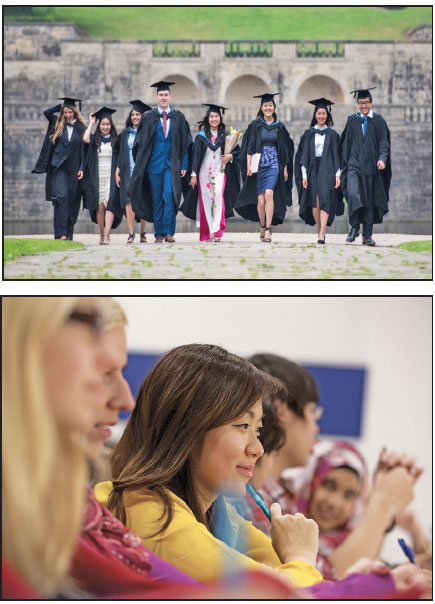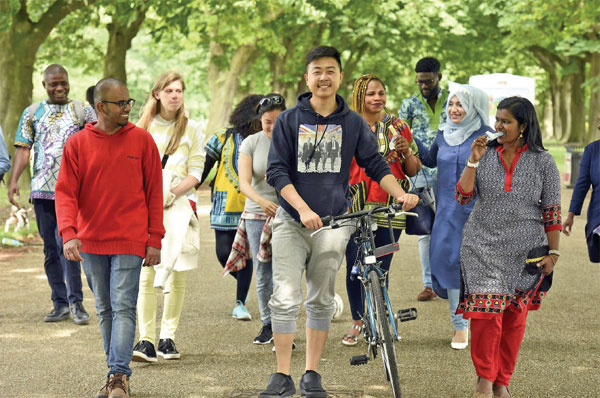UK unveils new plan for scholarships
British universities are offering postgraduate aid to Chinese students in fields such as engineering, law and bioscience. Xu Lin reports.
Chinese students who are applying for postgraduate studies in the United Kingdom have a new opportunity to receive financial support.
The British Council, together with 31 universities in the UK, recently unveiled the Great Scholarships 2018 - China campaign, with a total value of nearly £1 million ($1.3 million; 1.1 million euros).
The 31 institutions in England, Scotland, Wales and Northern Ireland will offer 150 postgraduate scholarships ranging from £5,000 to £20,000 in fields such as engineering, law and biosciences.
|
Chinese students, with their counterparts from across the globe, in Britain. Photos Provided to China Daily |
Scholarships will not be awarded in the form of cash, but will be presented directly as tuition fee waivers.
Chinese students can find more information on the scholarships on the individual websites of the universities involved.
Once they receive admission from participating universities for the autumn semester in 2018, they can then apply for the scholarships online.
The value and number of scholarships offered at each university vary, as do the types of courses available.
Individual universities will use different criteria to select the final candidates, whether it be their academic ability or social contribution, depending on the courses.
According to the British Council, from July 1, 2016, to June 30, 2017, about 82,000 study visas were issued to Chinese students, and 97 percent of those who applied were successful. This represented an increase in applications of 17 percent compared with the previous 12 months.
In the 2015-16 academic year, about 154,000 students from the Chinese mainland, Hong Kong and Macao were enrolled at UK universities.
"The UK is confident of its world-class education system and is committed to ensuring that all international students enjoy a diverse learning experience," says Jazreel Goh, director of education marketing at the British Council in China.
"An education in the UK will teach you how to think, not what to think. The skill will help you improve yourself. Those who have studied in the UK bring back three things - individuality, inspiration and creativity," she says.
According to Goh, students should not focus solely on the rankings of the UK universities when making their applications, but should consider their own interests and personalities.
Many Chinese graduates return to China for work due to the favorable development and work opportunities, Goh says.
The British Council organizes two job fairs a year for them.
"The University of Cambridge will support just one student from China studying for a master's degree with the Great Scholarships because we have to be evenhanded with students from different countries," says Sue Osterfield, deputy director of the Cambridge Commonwealth, European and International Trust, which provides international students at Cambridge with scholarships, including several hundred from China.
"Students need to be well-qualified to meet the entry requirements of our university."
She adds: "With more scholarships offered at Cambridge, we will attract the best students.
The university will not restrict the types of courses available to successful applicants who receive a��20,000 scholarship."
Successful candidates will still have to provide funds for living expenses and any additional tuition fees.
When assessing applicants' suitability for a scholarship, Osterfield says, the university will not only judge them on academic merit, but also take into account whether students will fit into the courses, their academic objectives and their personal statements.
According to Osterfield, Cambridge has experienced an increase in Chinese applicants in recent years, with most popular courses being engineering, physics, chemistry, mathematics and law.
Students from China also make up the second-largest group of overseas students at the university.
Three Chinese students for the PhD program and one for the master's program at the University of Liverpool will each receive a £5,500 Great Scholarship.
Contact the writer at xulin@chinadaily.com.cn




















